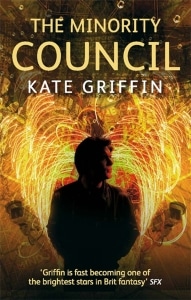The Minority Council by Kate Griffin (book review).
How well do you know the city you live in? Most of us have a good idea what our neighbourhood looks like and various routes to and from work, shops and meeting places with friends. Local newspapers might give a flavour of the rest of the city and the people who live there, but our perspective of their lives is coloured by media. Most of us have an idea about how the social class we belong to works, but what is outside our bubble? Unless our work brings us into contact with other social groups, we have little idea what really goes on outside our own circle. Reading books can give us some insight, though it is easy to feel that we are observing from a distance, perched in our ivory towers. Occasionally, along comes a writer who makes you think that they have actually walked the streets they talk about. A good urban novel can do this. Good urban fantasy is a different creature. It takes you below the grit of reality fiction and immerses the reader in sources of societies we scarcely know anything about. Once archetypes start to walk the city streets, the boundaries between reality and fantasy blur.
Readers of Kate Griffin’s urban fantasy will be familiar with Matthew Swift. He is a sorcerer who uses the magic that the people who have lived there throughout the ages have imbued it with. He is a meld of human and Blue Electric Angel. They were created or amalgamated from the bits left in the telephone wires by the people who used the system – the hopes and desires, the sighs and whispers that never got heard. He has had the post of Midnight Mayor thrust upon him and routed the entity known as the Death of Cities before making the summoner of it his apprentice and defused a war between the Neon Court and the Bikers to defeat Blackout an entity that was devouring London.
As Midnight Mayor, Swift has responsibility for the City of London, sorting out any magical threats to its fabric and people. He has a staff of Aldermen to help him but he doesn’t get on with their desire for neatness and for following the rule book.
‘The Minority Council’ begins with Swift dealing with some mind-bending graffiti in Deptford. On his way home, he takes a ride on the river taxi and meets Meera, a woman who has a touch of magical talent but is high on fairy dust. This is the first time he has come up against the drug. It is very expensive and, when taken, enhances whatever magical ability the user has. To begin with, he is only curious about it but when Meera is abducted and he finds out what it actually does and where it comes from, he begins a war against the Dust Houses. Some of his Aldermen advise Swift against this course of action but, as Swift has a strong sense of justice, he is inclined to ignore them, thus becoming a target for the fairy godmother, actually the male owner of the Dust Houses. It is then that he learns about the Minority Council. This is a group of Aldermen who think Swift is the wrong person to be Midnight Mayor and take actions to keep the chaos he leaves in his wake in check.
The Dust House problem is not the only one he has to deal with. Soon after his meeting with Meera, he discovers that the Aldermen have assigned him a PA, Kelly Shiring. It is her job to try and get him to meetings, look presentable (which includes wearing a tie!) and attend functions. In other words, she has the unenviable job of trying to make the Mayor behave like a Mayor. She is irrepressibly enthusiastic. Sneaking out of the building in an attempt to avoid Kelly, Swift is Nabeela, a social worker who is determined to speak with the Midnight Mayor. Without admitting who he is, he deflects her and listens to her concerns. As a result, he gets embroiled in another issue. To deal with anti-social behaviour, the Minority Council has created a soul-devouring monster which, although made with good intentions, has got out of hand. With the help of Penny Ngwenya, his apprentice, he attempts to resolve both problems.
This novel is infused with the kind of magic that can only exist within cities and which Swift is able to draw on. Griffin writes as if she is part of the city, showing us its intimate places through Swift’s eyes. In ‘The Minority Council’, the Barbican Arts Centre is the venue for an extraordinary, magical chase sequence with Swift trying to outrun the bloodhounds set upon him by a very pissed off fairy godmother as he flees and is followed through the cracks in the pavement.
Although part of a series, this book can be read on its own as the complexity of the magical London that sits under and alongside the one the human inhabitants knows is as complex in the first book, ‘A Madness Of Angels’, as it is here. Griffin adds to the mythos of vision of the dark side of London with each novel and as Swift learns more about the role of the Midnight Mayor, so does the reader. It is a series that needs to be read carefully to be fully appreciated but for those who enjoy, deep imaginative writing go for it. Find out what happens on the streets of the city when us mortals have retired for the night.
Pauline Morgan
(pub: Orbit. 414 page small enlarged paperback. Price: £ 8.99 (UK). ISBN: 978-0-356-50063-8)
check out websites: www.orbitbooks.net and www.kategriffin.net






